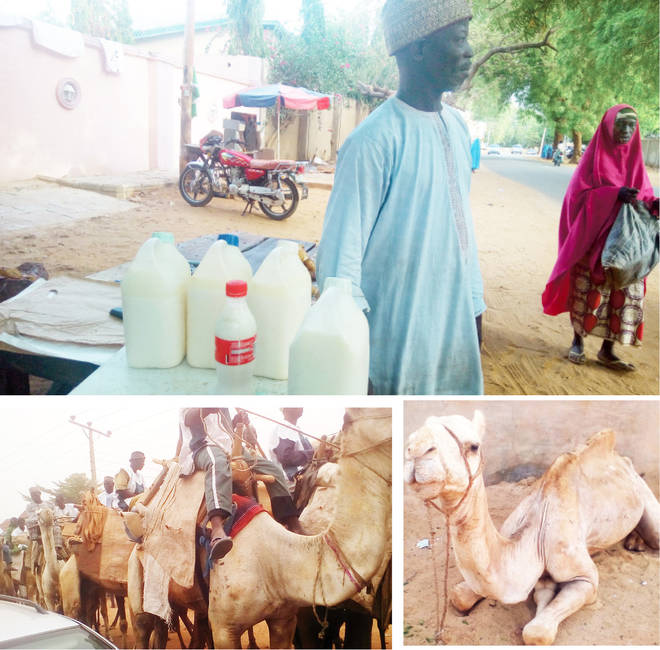Why camel milk, urine business thrives in Kebbi
Camel meat may not be in high demand or common among people when compared with those of cow, goat and ram, but its milk and urine are in high demand in various Kebbi communities. This is because they are considered to be exceptionally medicinal and nutritious. It is useful for curing different ailments in […]


Camel meat may not be in high demand or common among people when compared with those of cow, goat and ram, but its milk and urine are in high demand in various Kebbi communities.
This is because they are considered to be exceptionally medicinal and nutritious. It is useful for curing different ailments in the human body, more than any known animal milk and urine, its users claim.
Sellers and consumers of camel milk and urine, who are found in many Kebbi communities, attach different medicinal values to it. According to them, camel milk and urine have the efficacy to cure various diseases, including leprosy, stomach pain, swollen body, leg, waist pain, dandruff, high body temperature, cold. They added that a spoonful of it could be administered on a malnourished child to regain physical strength within a short time. They further said the milk could cure arthritis, impotence, ulcer, asthma, measles and high blood pressure. .
Based on these claims, people from far and near often come to Kebbi to buy camel milk and its urine. In recent times, it is common to see people from Ibadan in the South-West, Abuja, Kontagora, Jebba, and even from French-speaking countries coming to buy camel milk and urine in Kebbi State.
At Gwadangwaji, GRA in Birnin Kebbi, Makera, Zauro and other parts of the state, a litre costs as much as N1,600 while two litres cost N2,500 and three litres, N3,600. Despite the high cost of the milk, people still patronise the sellers.
Camels are known for bearing distinctive fatty deposits on their back, known as hump. There are two species of camel – the dromedary or one-humped (dromedarius), which are mostly found in the Middle East and the two-humped camel (bactrianus), found in Central Asia. The two have been domesticated for the purpose of food, transportation and other uses to man.
Salihu Zauro, a camel owner who also sells its milk and urine at Zauro area of Birnin Kebbi, said, “Many people come from far and near to buy camel urine and milk for different medicinal purposes.
“The camel is a blessed animal. Many things from it are useful for man, especially when it comes to curing illnesses. The urine and milk can be used to cure many diseases. Camel milk is as good as its urine. Apart from serving as a refreshing drink that cleans the body system, it can be used to cure many ailments. When it is squeezed out of the animal it will remain in milk form, but later it will change to yoghurt. We have used it to cure ulcer, asthma, stomach pain, high blood pressure and other ailments.” Zauro said he had been selling camel milk and urine for over 15 years.
Another camel milk seller at GRA, Malam Abdullahi Yellow, said arthritis patients also patronised them for camel milk because it gives them the needed relief. He said, “If people who suffer from arthritis drink camel milk regularly, it tends to clean their body system and all the dirt would be flushed as they urinate.
“People who have sexual problems or could not satisfy their wives in bed also come to me to buy camel milk and mix it with honey. This will make couples, especially the man, to be more sexually active.
“It can also be used to cure those who suffer from leprosy. They only need to mix the camel milk with its urine. The bone marrow of the camel is used for patients suffering from waist pains or back aches. The liver is also useful for the body.
“Over the years, people have seen positive results from camel milk and urine; that is why, for over 15 years now, people from everywhere approach me for either the urine or milk. People from many places like Abuja, Kontagora, Charagi, Kuku, Yauri, and even outside Nigeria, especially those from French-speaking countries, have been coming to patronise me.
“What people don’t know is that even the skin and the excreta of the camel can be used for medicinal purposes.’’
Malam Adamu Bello, a camel milk seller at the Gwadangwaji area of Birnin Kebbi, told our correspondent that his customers come from different parts of the country. “I go to Niger Republic to get milk from their camels. People from Jebba, Dodoru, Lagos and Oyo come to buy from me here in Kebbi. I sell a gallon of the milk at N3,000.
“I have benefitted tremendously from the camel milk business. From this business I have travelled on holy pilgrimage to Saudi Arabia. I used part of my proceeds to marry out my three daughters. I thank God that camel is a blessed animal from God; virtually every part of it is useful and medicinal.
However, the Head of Clinical Services, Sir Yahaya Specialist Hospital, Birnin Kebbi, Dr Abubakar Kaoje, told our correspondent that the claims on the medicinal values of camel milk and its urine had not been scientifically proven to be correct.
Another medical expert at the Kebbi State Primary Health Care Development Agency, Dr Abdulrasheed Bello, said he was not aware of any medical research that proved the claims on camel milk and urine either right or wrong. “As a medical expert, I have not done any research into these claims to prove them right or wrong. And I am not aware of any research that has proved the claims,’’ Bello said.
